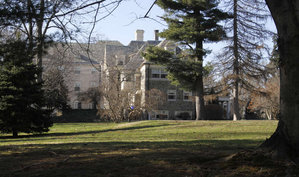ST. Joseph's Buying Cardinal's Mansion for $10m
By David O'Reilly
St. Joseph's University announced Friday that it would acquire the cardinal's residence on City Avenue from the Archdiocese of Philadelphia for $10 million. The stone mansion, on 8.9 acres, has served as the home of the archbishops of Philadelphia since 1935, when the church bought it for Cardinal Dennis Dougherty for $115,000. Archbishop Charles J. Chaput, who assumed leadership of the archdiocese one year ago, put the 16-room residence on the market in January. In June, he reported that the archdiocese faced a $17.5 million operating debt. Sources said Chaput, a Franciscan Capuchin friar, was not comfortable living in a baronial-style mansion as he was preparing his flock for school and parish closings to trim the deficit. He has also put the retired priests' summer home in Ventnor, N.J., up for sale, with an estimated value of $6 million. The Rev. C. Kevin Gillespie, president of St. Joseph's, said the university had no immediate plans for the property but might use it temporarily for administrative offices. He also said it would be "integral to the university's long-term strategic planning." Funding for the purchase will come from "donor support and internal resources," according to the university. The grounds, which sweep from City Avenue to Overbrook Avenue and flank the one-block Cardinal Avenue (formerly 57th Street), are directly adjacent to the university's 48-acre campus. Chaput said in a recent interview that when the residence is sold, he will relocate to the apartment at St. Charles Borromeo Seminary in Wynnewood that the late Cardinal Anthony J. Bevilacqua occupied after his retirement in 2003. In 1999, while the archbishop of Denver, Chaput sold his predecessors' villa and moved into the diocesan seminary. Surrounded by a tall iron fence, the Philadelphia property includes a gardener's cottage and a six-car garage, and is entered through a gate on Cardinal Avenue. Its only contiguous neighbor is a convent of cloistered nuns. Cardinal John Krol, who took over in 1961, installed a par-3 golf hole and putting green on the grounds. To Bevilacqua's considerable irritation, Krol not only stayed in the residence but kept the better apartments until his death in 1996. Visitors have included Pope John Paul II, in 1979, and Cardinal Eugene Pacelli, the future Pope Pius XII, in 1936. Dougherty, son of a Schuylkill County coal miner, acquired the property, then called "the Terraces," from the estate of Richard J. Seltzer, a Realtor. There he lived "like a Renaissance prince" for the next 33 years, according to the historian Jay P. Dolan. It was not his first foray into princely living. Eight years before acquiring the Terraces, Dougherty had vacated the cathedral rectory on Race Street that had been his dwelling and that of several previous archbishops. He moved into a 25-room mansion at 5400 City Ave. donated to the church by an oil tycoon. As great numbers of Catholic immigrants swelled northern cities early in the last century, many bishops traded modest rectory apartments for villas and mansions, symbols of their newfound political clout. In recent years, however, deacquisition of these properties has been the trend. In 2004, the Archdiocese of Boston sold its cardinal's mansion and 44 surrounding acres to Boston College for $99 million to help pay claims to victims of clergy sex abuse. In 1989, the Archdiocese of Detroit sold its 40,000-square-foot mansion - the largest private dwelling in that city - to a basketball star. And in 2002, Cardinal Francis George of Chicago - a religious-order priest like Chaput - wondered publicly how he could ask his priests "to display humility in their lives" when he was living in a brick mansion with 19 chimneys and estimated to be worth $20 million. Fearful that it might be destroyed if sold, however, preservationist groups protested so vigorously that George has yet to sell it. Contact David O'Reilly at 610-313-8111 or doreilly@phillynews.com
|
.
Any original material on these pages is copyright © BishopAccountability.org 2004. Reproduce freely with attribution.
